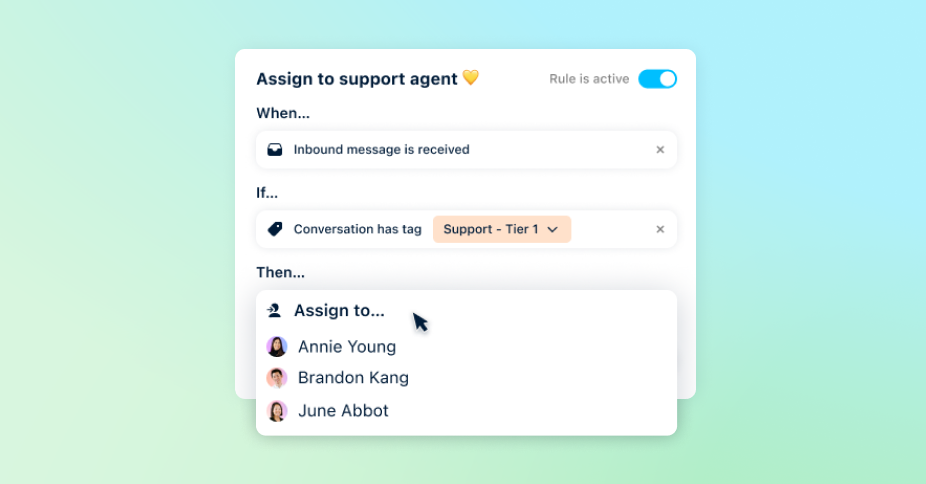Ticketing systems offer several core benefits for teams. Their main purpose is to provide a centralized platform for managing communication between customers and support teams, allowing for more efficient issue resolution and boosting customer satisfaction.
And investing in customer satisfaction matters — in fact, 78% of consumers use customer service to decide whether or not to do business with a company.
In this guide, we’ll aim to help readers determine if a ticketing system is right for their business and provide guidance on selecting the one most suitable for their needs.
Table of contents
What is a ticketing system?
Top six ticketing system solutions for 2024
How does a help desk or ticketing system work?
How to select the right ticketing system
The benefits of a ticketing system
Discover why Front leads the pack
What is a ticketing system?
A ticketing system is a centralized software platform used to organize and manage customer service inquiries efficiently. It’s a structured method for tracking, prioritizing, and resolving customer issues, making timely responses and strong customer satisfaction possible. For small to medium-sized businesses (SMBs), ticketing systems often offer streamlined features tailored to their specific needs, like basic automation functionalities and simple integrations. Ticketing systems for enterprise-level organizations can boast advanced features, including advanced automation, robust analytics, and extensive customization options.
Who should not use a traditional ticketing system? Traditional ticketing systems excel in structured support environments, but they may not be suitable for businesses with highly specialized or personalized customer service needs. Some modern ticketing systems like Front are also able to support these personalized, more complex cases by bringing in more real-time collaboration capabilities and could be a good fit.
Top six ticketing system solutions for 2024
Ticketing software | Starting price | Top features (may require higher plan) | Best for? |
|---|---|---|---|
Front | Starter: $19/seat/mo |
| Modern, collaborative customer service |
Zendesk | Basic support team: $19/agent/month |
| Transactional support |
Freshdesk | Growth: $15/agent/month |
| Transactional support |
Intercom | Essential: $39/seat/month |
| Chat-based transactional support |
Salesforce Service Cloud | Starter suite: $25/user/month |
| Teams looking to consolidate vendors across departments |
HubSpot Service Hub | Starter customer platform: $15/seat/month |
| Teams looking to consolidate vendors across departments |
Front
Front is a modern help desk ticketing solution built for collaborative customer service for all types of inquiries — from simple answers to complex issues that require coordination across multiple teams. Front helps teams design exceptional customer experiences and maintain a premium level of service, even as their business grows.
Core Front features include:
Easy-to-use interface: Manage customer support without the complexity and learning curve of typical ticketing tools. Ease of implementation and adoption from the inbox-like interface gets customer-facing teams to value faster. Skip the long and costly onboarding process: implementing Front is quick, simple, and does not require 3rd party consultants.
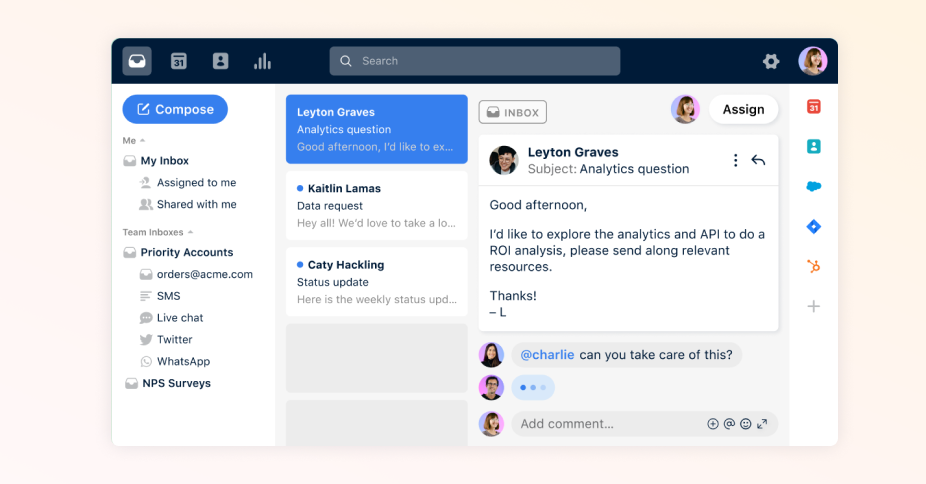
Omnichannel support: Centralize every customer conversation in one platform. Consolidate messages from all your communication channels — email, SMS, social media, live chat, WhatsApp — all within Front. Your team works more efficiently, while your customers get a seamless experience.
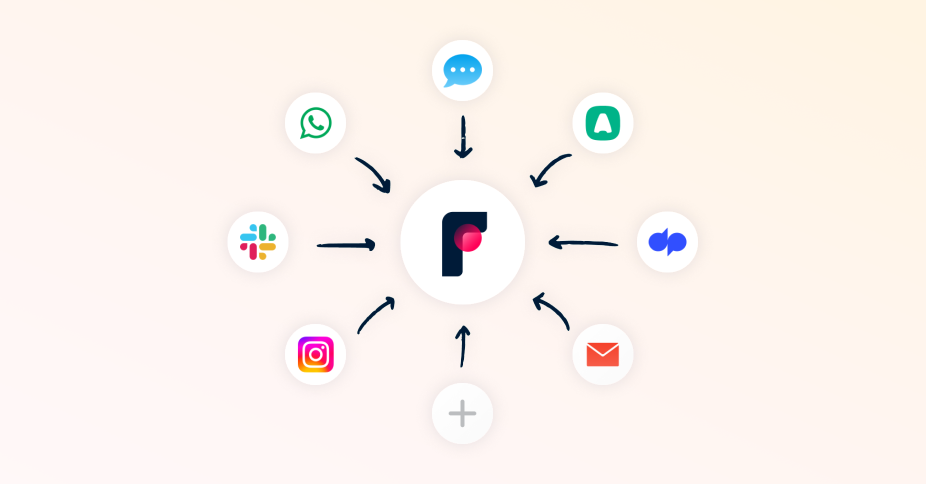
Robust, no-code workflows and integrations: Build and maintain powerful automated workflows to streamline customer communication, so agents spend less time on manual, repetitive tasks. With Front, you can aggregate, route, and assign messages so everyone knows exactly what they need to work on. Integrate your most used tools and systems to streamline processes and maximize teammate productivity.
Comprehensive, customizable platform: Front is a comprehensive platform that incorporates everything agents need to support their customers – from transactional inquiries that can be solved with Front’s native knowledge base, chatbots, or AI Answers to complex issues requiring behind-the-scenes coordination across multiple teams.
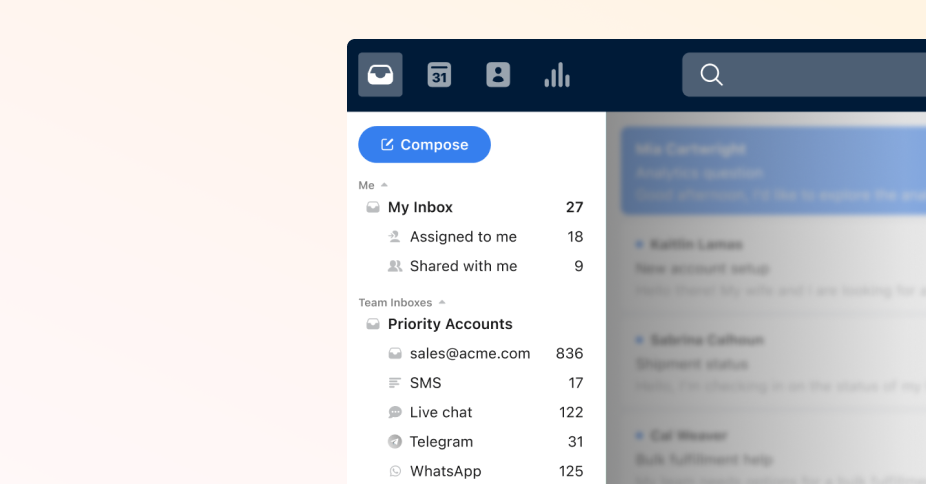
Real-time ticket collaboration: Keep teammates and cross-functional teams and stakeholders in lockstep with real-time collaboration features like mentions and comments. Front ensures everyone has alignment without having to switch to other applications to follow up or share additional context.
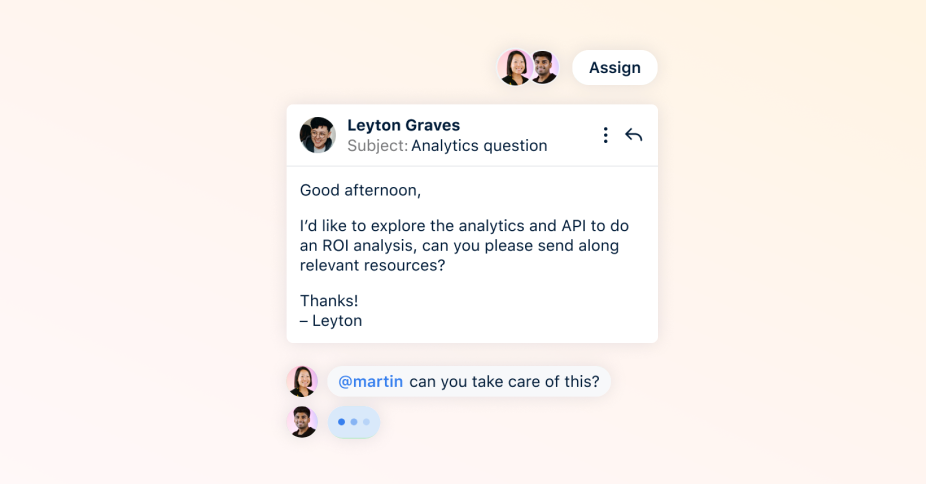
Front G2 rating: 4.7 / 5
Starter: $19/seat/mo
Growth: $59/seat/mo
Scale: $99/seat/mo
Premier: $229/seat/mo
Check out Front’s newest features
Zendesk
Zendesk leverages the design of a help desk ticketing system, allowing businesses to track, prioritize, and respond to customer inquiries and issues efficiently. The platform offers advanced features such as automation, SLA management, and reporting within the system, however, additional integrations are needed for businesses looking to create streamlined collaboration across teams.
Zendesk is best suited to more high volume support environments where simple inquiries tend to be solved by agents individually without as much coordination with others.
Core features:
Integrations
Ticket collaboration
Knowledge base
Live chat
Zendesk G2 rating: 4.3 / 5
Pricing:
Support team: $19/agent/month
Suite team: $55/agent/month
Suite growth: $89/agent/month
Suite professional: $115/agent/month
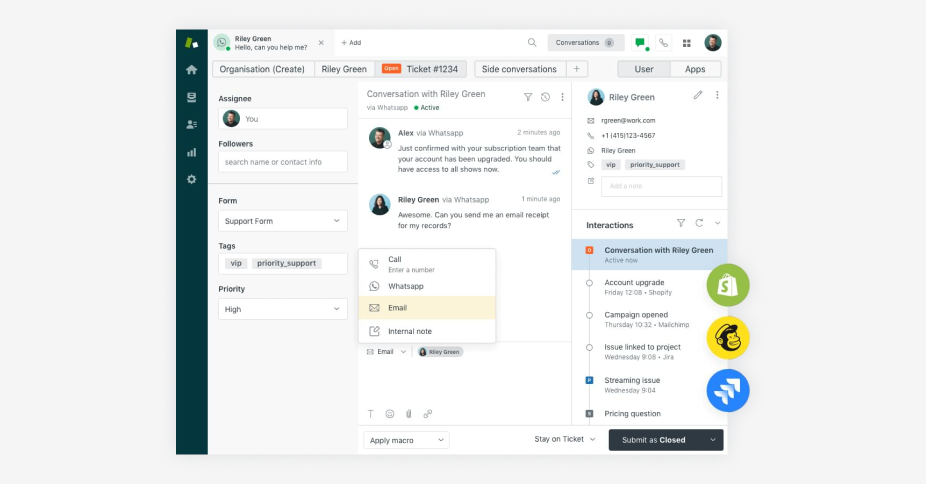
Freshdesk
Freshdesk offers a robust ticketing system that allows customer service teams to manage incoming queries from multiple channels including email, phone, chat, and social media. Tickets are routed to groups rather than a single owner, so all agents work out of a shared ticket queue. Because Freshdesk is designed for transactional inquiries that don’t require collaboration with cross-functional teams, it works best when only providing simple service.
Freshdesk is scalable and offers flexible pricing plans.
Core features:
Custom ticket views
Email ticket routing
Knowledge base
Time tracking
Freshdesk G2 rating: 4.4 / 5
Pricing:
Growth: $15/agent/month
Pro: $49/agent/month
Enterprise: $79/agent/month
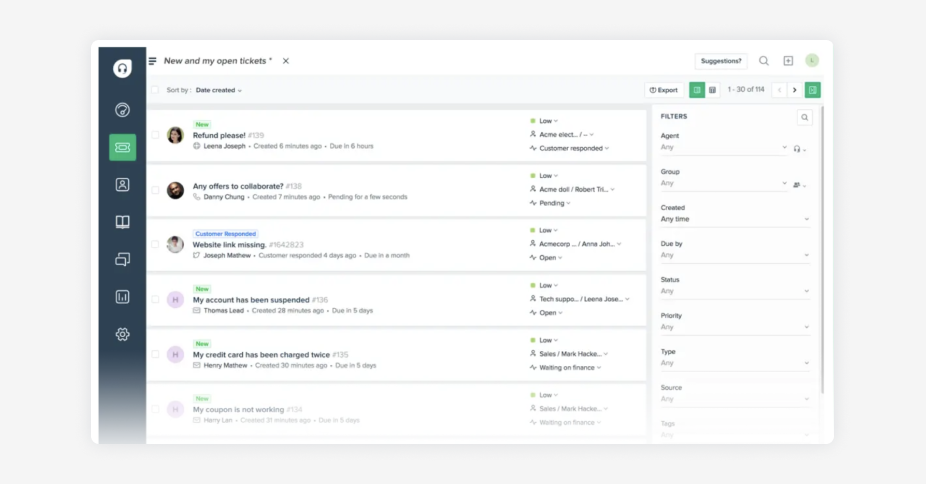
Intercom
Intercom is a ticketing platform for synchronous, chat-based support. It offers a conversational approach to customer communication, allowing businesses to engage with customers in real time.
Intercom is heavily investing in its AI offering, Fin. Fin can be inserted into chatbot workflows and leveraged in the helpdesk to streamline resolutions.
Core features:
Fin AI
Analytics and reporting
Live chat
Integrations
Intercom G2 rating: 4.5 / 5
Pricing:
Essential: $39/seat/month
Advanced: $99/seat/month
Expert: $139/seat/month
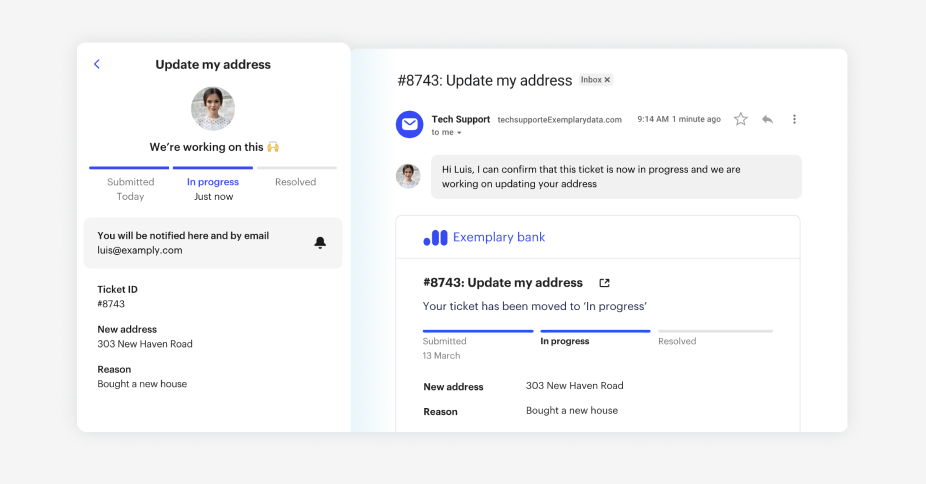
Salesforce Service Cloud
Salesforce Service Cloud is part of the broader Salesforce portfolio, making it ideal for teams already using Salesforce and looking to consolidate vendors. However, the interface is optimized for large enterprise teams. It provides a comprehensive view of the customer by consolidating data from various sources, including CRM systems, service interactions, purchase history, and social media activity.
Service Cloud operates off of a case management model. Its configuration is deep and robust, but flexibility is a double-edged sword — it’s complex, and it requires dedicated time and training to learn, implement, and maintain.
Core features:
Integration with Salesforce CRM
AI-powered service, incorporating Einstein AI
Workflow automation
Live agent chat
Salesforce Service Cloud G2 rating: 4.3 / 5
Pricing:
Starter suite: $25/user/month
Professional: $80/user/month
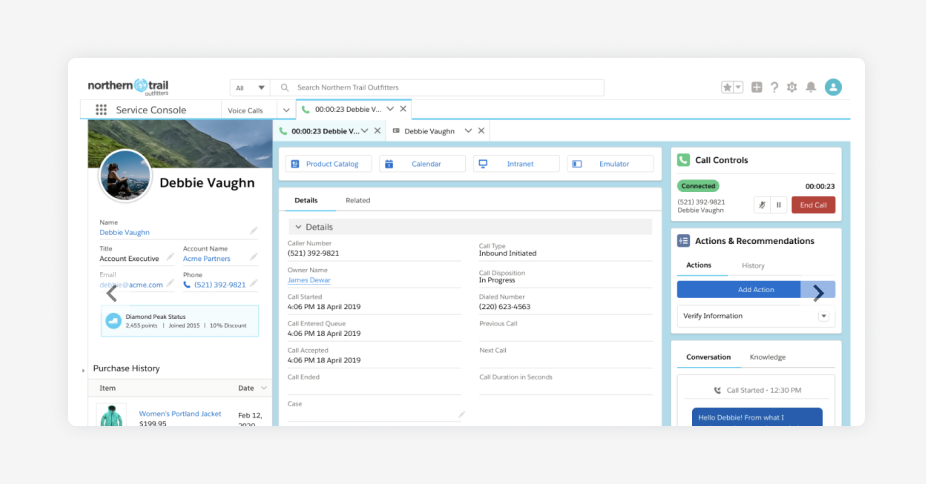
HubSpot Service Hub
Service Hub is part of a broader HubSpot portfolio, primarily known for its Marketing Hub, which is helpful for teams looking to consolidate vendors. For support teams, Service Hub fits the classic ticketing use case.
Service Hub offers native integrations with its own line of HubSpot products, but has limited channel support – personal/shared email, chat, forms, Facebook Messenger, and Whatsapp Business.
Core features:
Conversational tools
Reporting and analytics
Help desk automation
Integrations with HubSpot products
HubSpot Service Hub G2 rating: 4.4 / 5
Pricing:
Starter: $20/month/seat
Professional: $100/month/seat
Enterprise: $130/seat/month
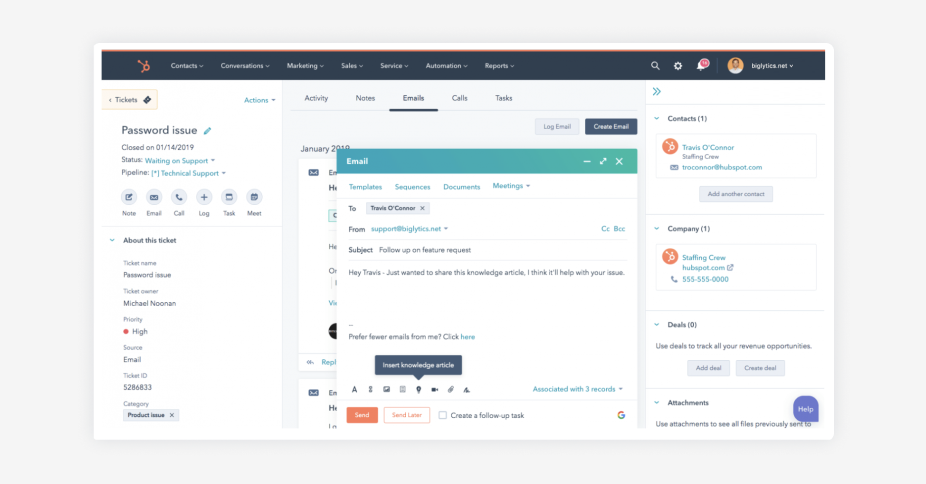
How does a help desk or ticketing system work?
A ticketing system is used by organizations to manage requests or issues raised by customers, users, or employees. These systems are commonly used in customer support, IT help desks, and service management.
The process begins when a user submits a request or reports an issue via email, web form, or through a self-service portal. Support tickets are categorized based on various criteria such as the type of request (e.g., technical support, sales inquiry), the urgency of the issue (e.g., low, medium, high), and the department or team responsible for resolving it.
Once classified, the ticket is assigned to the appropriate individual or team for resolution. Throughout the lifecycle of the ticket, its status is continuously updated to reflect progress. Once the issue is resolved or the request is fulfilled, the ticket is marked as closed. Ticketing systems include reporting features that allow organizations to analyze various metrics such as response times, resolution times, ticket volumes, and customer satisfaction scores.
How to select the right ticketing system
The right support ticket system can streamline operations and improve customer satisfaction. But how do you know you need one and how to choose the right one?
Common challenges businesses might face before deciding they need a ticketing system include:
Support requests slipping through the cracks
Duplicate responses sent to the same inquiry
Lack of clarity on ownership of complex support issues
Team feedback is subjective and not tied to measurable outcomes
Difficulty in collaborating on cases with full transparency
Before diving into selecting the right ticketing system for you, consider some important questions:
Does your team require collaborative coordination to resolve customer issues?
Modern customer service platforms like Front can make it simple to track support requests within a familiar inbox setup that’s easy to use. Front empowers support teams to collaborate with each other and other areas of the business.
For example: Take Front customer Essentialist, a private membership service for travelers seeking unique luxury travel experiences, who started using Front to ensure an exceptional experience with every member interaction as they scaled. The platform brought visibility and efficiency to the member support experience, skyrocketing the company’s CSAT score to an all-time high. As Essentialist CEO puts it, “our company’s collaboration has drastically improved thanks to Front.”
How many channels do you use?
Think about how many channels you’ll need to use and how you’ll reduce context switching. Some solutions, like Front, keep teams in a single interface rather than needing to toggle between channels.
Do you have the right team in place to implement the new tool easily?
For any new tool you bring on, you need the right team to onboard and implement it quickly. Some tools will be easily folded into existing processes, some will take more time. Does the ticketing system provide the customer support you need to get your team quickly up to speed?
How much do you care about personalization in support?
Some support teams care only about speed, while others place weight on both speed and personalization in replies to customers. Some solutions, like Front, offer message formatting with ticketing logic managed on the back end, so customers can reply to a human and it’s a 1:1 response.
Which tools do you currently use and do they integrate easily with the help desk ticketing solution?
It’s worth assessing your current toolset and what integrations are supported with the ticketing system you bring on. Will this suit your business and its needs one year, five years from now?
What are the benefits of a help desk ticketing system?
A help desk ticketing system offers many benefits for both the support team using it and a business’s customers.
Here are some top benefits:
Efficient issue tracking: Provides a centralized platform to log and track all incoming support requests, ensuring no issue falls through the cracks.
Improved organization: Tickets can be categorized, prioritized, and assigned to specific team members or departments based on their expertise and workload, streamlining the resolution process.
Better collaboration: By consolidating customer inquiries, issues, and requests into a single platform or dashboard, you ensure team members have access to all relevant information. Team members can collaborate effectively without having to switch between multiple communication channels.
Enhanced customer communication: Facilitates seamless communication between support agents and users/customers. Users can submit their requests through various channels (email, web portal, etc.), and agents can update them on the progress or request additional information directly within the ticket.
Faster resolution times: With clear categorization and assignment of tickets, support agents can address issues more promptly, leading to faster resolution times and increased customer satisfaction.
Knowledge management: Ticketing systems often include knowledge bases or FAQs where common issues and their solutions are documented. This empowers users to find answers to their questions independently and reduces the number of repetitive inquiries.
Performance monitoring: Managers can track key metrics such as response times, resolution times, and ticket volumes to gauge the performance of the support team and identify areas for improvement.
Data analysis and insights: Ticketing systems generate valuable data that can be analyzed to identify trends, recurring issues, and areas where additional training or resources may be needed.
Scalability: As businesses grow, help desk ticketing systems can scale to accommodate increased support volume and additional support channels without sacrificing efficiency or quality of service.
Discover why Front leads the pack
While there are many ticketing system options, Front is strongest for collaborative customer service — for both simple and complex inquiries requiring coordination across different teams.
Front is known (and loved) for its familiar interface that feels like an email inbox with real-time collaboration built right in. Despite its ease of use, Front has all the efficiency features you need through powerful workflow automation. Front can help bridge silos between teams and also offers stronger personalization capabilities than in other ticketing systems.
Experience the difference with Front’s ticketing system – get started today.
Written by Sara Shaughnessy
Originally Published: 10 April 2024
